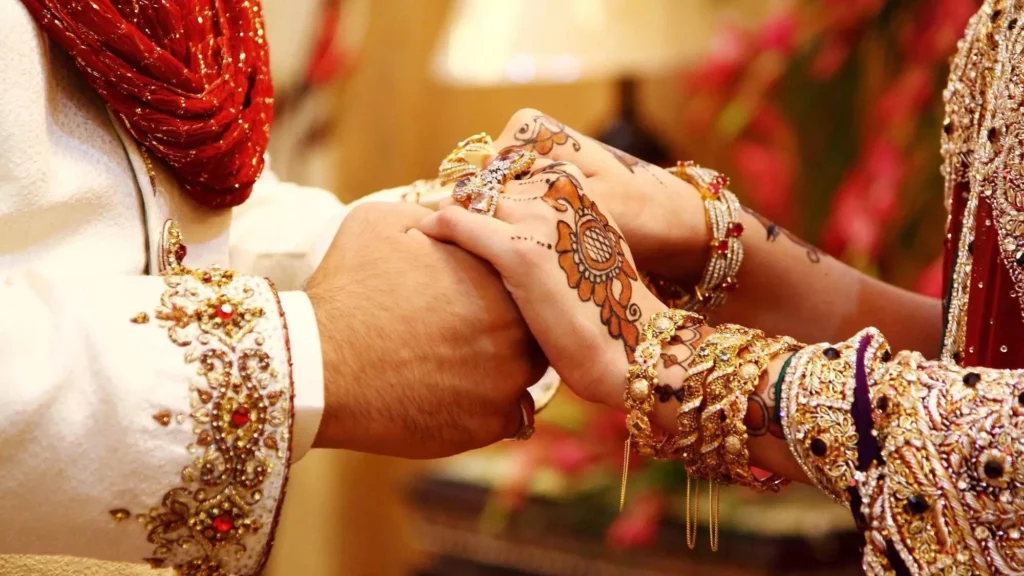Arranged marriage is a centuries-old practice that continues to be prevalent in many cultures around the world. It is a union where the families of the bride and groom play a significant role in selecting their life partners. While this practice has its roots in cultural traditions and societal norms, it has also been a subject of debate and scrutiny. In this article, we will explore the various facts of arranged marriage issues, exploring its challenges, & benefits.
Contents
Understanding The Arranged Marriages
 Arranged marriage is a cultural practice in which the selection of a life partner is primarily orchestrated by the families of the individuals involved. It is prevalent in many societies around the world, particularly in South Asia, the Middle East, and certain parts of Africa.
Arranged marriage is a cultural practice in which the selection of a life partner is primarily orchestrated by the families of the individuals involved. It is prevalent in many societies around the world, particularly in South Asia, the Middle East, and certain parts of Africa.
In an arranged marriage, the decision-making power rests largely with the parents or elders who take into account various factors, such as social status, family background, education, religion, and financial stability when considering potential matches. The individuals being married may have limited or no say in the selection process.
There are different types of arranged marriages. In some cases, the families may introduce the prospective bride and groom to each other, allowing them to interact and get to know each other before deciding on the marriage. In other cases, the couple may meet for the first time on their wedding day.
What Are The Common Issues Of Arranged Marriages?
 Arranged marriages, like any form of marriage, can present certain challenges. While the specific issues can vary depending on cultural, individual, and familial factors.
Arranged marriages, like any form of marriage, can present certain challenges. While the specific issues can vary depending on cultural, individual, and familial factors.
Here are some commonly reported challenges in arranged marriages:
- Compatibility Issues: Despite efforts to match individuals based on shared values and backgrounds, compatibility issues can arise in arranged marriages. Differences in personalities, interests, goals, and expectations may become apparent after marriage, leading to conflicts and difficulties in adjusting to each other.
- Lack of Prior Knowledge: In some arranged marriages, the couple may have limited or no prior knowledge of each other before getting married. This lack of familiarity can make it challenging to establish emotional connections and understand each other’s needs and preferences.
- Unrealistic Expectations: There can be societal and familial pressure to conform to certain roles and expectations within an arranged marriage. Unrealistic expectations about the roles of spouses, family dynamics, or cultural norms can create tension and dissatisfaction within the relationship.
- Communication and Emotional Intimacy: Building effective communication and emotional intimacy can take time and effort in any marriage, and it may pose additional challenges in arranged marriages. Lack of shared experiences and limited pre-marital interaction can hinder the development of open and effective communication patterns.
- Autonomy and Decision-making: In some cases, arranged marriages may involve limited autonomy and decision-making power for the individuals involved. External influences and pressure from families can impact the ability to make independent choices, leading to feelings of frustration or a lack of personal agency.
It’s important to note that these challenges are not exclusive to arranged marriages and can be present in any marriage. Many couples in arranged marriages successfully navigate these challenges through effective communication, mutual understanding, compromise, and support from their families and communities.
The Impact Of Arranged Marriages On Individuals
Arranged marriages can have both positive and negative effects on the individuals involved. Let’s examine some of the key impacts:
Emotional Challenges and Adaptation
Entering into an arranged marriage can be emotionally challenging, as individuals might have limited knowledge or understanding of their future spouse. Adjusting to a new life partner and building emotional intimacy requires effort, patience, and effective communication.
Societal Pressure and Expectations
In societies where arranged marriages are prevalent, there can be immense pressure on individuals to conform to traditional norms. This pressure can manifest in societal expectations regarding gender roles, family obligations, and the need to prioritize family harmony over personal desires.
Supportive Family Networks
Supportive family networks refer to the presence of a close-knit and caring family structure that provides emotional, practical, and social support to its members. These networks offer a sense of belonging, understanding, and assistance during challenging times, fostering a supportive and nurturing environment within the family unit.
Cultivating Compromise and Longevity
Cultivating compromise and longevity involves the practice of finding common ground and making mutual concessions in relationships or situations. It requires individuals to prioritize cooperation, understanding, and flexibility to ensure the long-term sustainability and success of the partnership or endeavor.
Are There Any Positive Effects Of Arranged Marriage?
 Arranged marriages, despite their criticism and controversy, are often associated with certain positive aspects. It’s important to note that these positive aspects are based on cultural and individual experiences and can vary significantly.
Arranged marriages, despite their criticism and controversy, are often associated with certain positive aspects. It’s important to note that these positive aspects are based on cultural and individual experiences and can vary significantly.
Here are some commonly mentioned positive aspects:
- Strong Family Support: In arranged marriages, families play a central role in the selection process. This involvement can provide a strong support network for the couple throughout their marriage.
- Commitment to the Marriage: Arranged marriages are often approached with a long-term perspective. Commitment to making the relationship work. Both families and the couple themselves are invested in the success of the marriage. That can contribute to greater effort in resolving conflicts and maintaining the relationship.
- Lower Divorce Rates: Some studies suggest that arranged marriages may have lower divorce rates compared to love marriages. This can be attributed to the strong support system, the emphasis on compatibility, and the commitment to the marriage. However, it’s important to note that divorce rates can be influenced by various cultural, societal, and individual factors.
- Extended Social Networks: Arranged marriages often bring together not just the couple, but also their families and extended social networks. This can provide a sense of belonging, community, and a wider support system for the couple. Extended social networks can be a source of guidance, advice, and assistance throughout their married life.
It’s important to recognize that these positive aspects are not exclusive to arranged marriages and can also be found in love marriages or other types of unions. Additionally, arranged marriages are diverse and can differ greatly depending on cultural, individual, and familial contexts. The positive aspects mentioned here are general observations and may not apply universally to all arranged marriages.
The Success Rate Of Arranged Marriages
 The success rate of arranged marriages is a complex and debated topic. It can vary depending on various factors such as culture, individual circumstances, and definitions of success. It is challenging to provide a definitive success rate as it influences by subjective interpretations and cultural contexts.
The success rate of arranged marriages is a complex and debated topic. It can vary depending on various factors such as culture, individual circumstances, and definitions of success. It is challenging to provide a definitive success rate as it influences by subjective interpretations and cultural contexts.
While some studies suggest that arranged marriages have a higher rate of long-term stability. Along with lower divorce rates compared to love marriages. It is important to note that these findings may not be applied universally. It can vary across different cultures and societal contexts.
The success of an arranged marriage is multifaceted and can be assessed based on various factors. Including marital satisfaction, emotional well-being, and the ability of the couple to navigate challenges. While maintaining a healthy relationship over time. Individual experiences and personal happiness within the marriage are also crucial indicators of success.
Conclusion
In conclusion, arranged marriages can present various challenges that couples may need to navigate. These challenges include compatibility issues, lack of prior knowledge, unrealistic expectations, communication difficulties, limited autonomy, and cultural adaptation. However, it is important to note that these issues are not exclusive to arranged marriages. It can be present in any type of marriage. With open communication, understanding, mutual respect, and a willingness to work through these challenges. Couples in arranged marriages can build strong and fulfilling relationships.
Marriage is a beautiful journey, However, every marriage encounters challenges. If you have any queries regarding Online Marriage Counseling experienced therapists at CoupleMantra can help: Book a trial couple therapy session.


